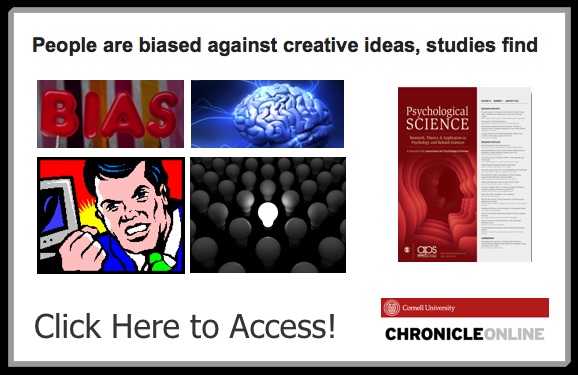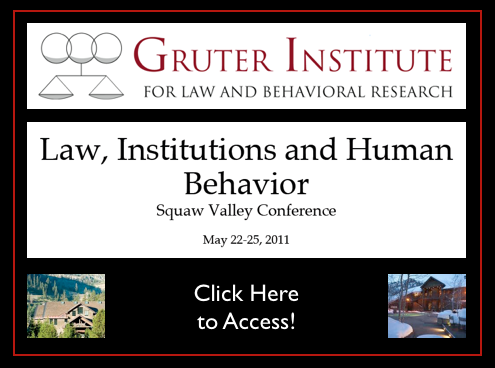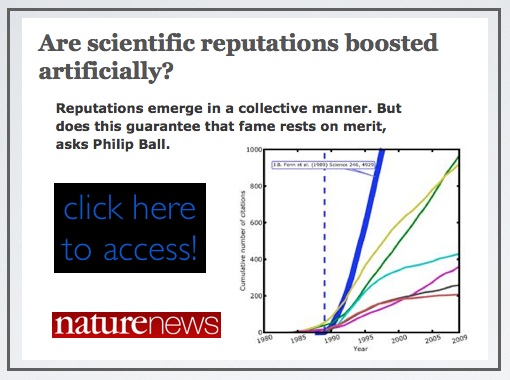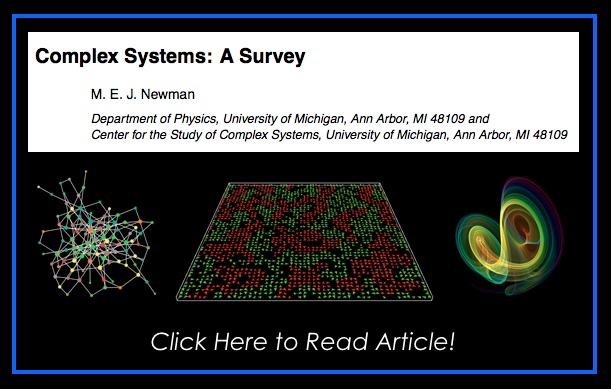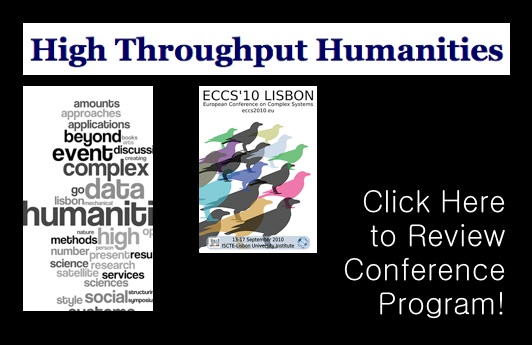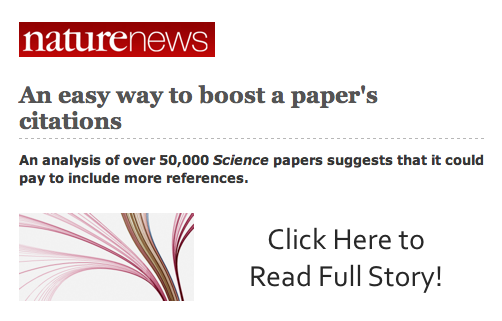Tag: structure of science
Tim Harford: Trial, Error and the God Complex [ Ted 2011 ]
Economics writer Tim Harford studies complex systems — and finds a surprising link among the successful ones: they were built through trial and error. In this sparkling talk from TEDGlobal 2011, he asks us to embrace our randomness and start making better mistakes.
Complex Systems: A Survey
From the abstract: “A complex system is a system composed of many interacting parts, often called agents, which displays collective behavior that does not follow trivially from the behaviors of the individual parts. Examples include condensed matter systems, ecosystems, stock markets and economies, biological evolution, and indeed the whole of human society. Substantial progress has been made in the quantitative understanding of complex systems, particularly since the 1980s, using a combination of basic theory, much of it derived from physics, and computer simulation. The subject is a broad one, drawing on techniques and ideas from a wide range of areas. Here I give a short survey and an annotated bibliography of resources for those interested in learning about complex systems.” [By Mark E.J. Newman – Submitted to Amer. J. Physics]
Complex systems is a relatively young subject area and one that is evolving rapidly, but there are nonetheless a number of general references, including books and reviews, that bring together relevant topics in a useful way. ” The paper then has recommended materials on major topics relevant to the study of complex systems including:
- Lattices and Networks
- Dynamical Systems (including Chaos & Fractals)
- Discrete Dynamics and Cellular Automata
- Scaling and Criticality
- Adaptation and Game Theory
- Information Theory
- Computational Complexity
- Agent-Based Modeling
“Classic examples of complex systems include condensed matter systems, ecosystems, the economy and financial markets, the brain, the immune system, granular materials, road traffic, insect colonies, flocking or schooling behavior in birds or fish, the Internet, and even entire human societies.”
Robert Trivers: Mathematical Approaches to Problems in Evolutionary Social Theory
Trivers is always very enlightening. Also, check out Part 2 and Part 3 … [HT to Fabio Rojas at OrgTheoryBlog]
Humanities in the Digital Age [Via MIT World]
About the Lecture: “Reports of the demise of the humanities are exaggerated, suggest these panelists, but there may be reason to fear its loss of relevance. Three scholars whose work touches a variety of disciplines and with wide knowledge of the worlds of academia and publishing ponder the meaning and mission of the humanities in the digital age. Getting a handle on the term itself proves somewhat elusive. Alison Byerly invokes those fields involved with “pondering the deep questions of humanity,” such as languages, the arts, literature, philosophy and religion. Steven Pinker boils it down to “the study of the products of the human mind.” Moderator David Thorburn wonders if the humanities are those endeavors that rely on interpretive rather than empirical research, but both panelists vigorously make the case that the liberal arts offer increasing opportunities for data-based analysis.
Technology is opening up new avenues for humanities scholars. In general, Byerly notes, humanities “tend to privilege individual texts or products of the human mind, rather than collective wisdom or data.” More recently, online collections or data bases of text, art and music make possible wholly different frameworks for study.
Humanists are adopting new tools and methods for teaching and publishing as well. As Pinker notes, the process for publishing articles in scholarly journals remains painfully slow: in experimental psychology, a “six year lag from having an idea to seeing it in print.” He suggests a “second look” at the process of peer review, perhaps publishing everything online, “and stuff that’s crummy sinks to the bottom as no one links to or reads it.” Pinker looks forward to a future where he no longer has to spend a “lot of time leafing through thick books” looking for text strings, or flipping to and from footnotes. “We could love books as much as we always have, but not necessarily confine ourselves to their limitations, which are just historical artifacts,” he says.”
High Throughput Humanities – ECCS Satellite Conference (Lisboa 2010)
As we speak, I am currently in route to Portugal for the very exciting High Throughput Humanities meeting on Wednesday. As we believe it fits well within the goals of the meeting, I will briefly present our work on the United States Code (including a brief preview of our still unreleased new paper). Anyway, for those not familiar with the meeting, if you click on the image above you will be taken to the main page. Also, here is the announcement for the meeting:
“The High Throughput Humanities satellite event at ECCS’10 establishes a forum for high throughput approaches in the humanities and social sciences, within the framework of complex systems science. The symposium aims to go beyond massive data aquisition and to present results beyond what can be manually achieved by a single person or a small group. Bringing together scientists, researchers, and practitioners from relevant fields, the event will stimulate and facilitate discussion, spark collaboration, as well as connect approaches, methods, and ideas.
The main goal of the event is to present novel results based on analyses of Big Data (see NATURE special issue 2009), focusing on emergent complex properties and dynamics, which allow for new insights, applications, and services.
With the advent of the 21st century, increasing amounts of data from the domain of qualitative humanities and social science research have become available for quantitative analysis. Private enterprises (Google Books and Earth, Youtube, Flickr, Twitter, Freebase, IMDb, among others) as well as public and non-profit institutions (Europeana, Wikipedia, DBPedia, Project Gutenberg, WordNet, Perseus, etc) are in the process of collecting, digitizing, and structuring vast amounts of information, and creating technologies, applications, and services (Linked Open Data, Open Calais, Amazon’s Mechanical Turk, ReCaptcha, ManyEyes, etc), which are transforming the way we do research.
Utilizing a complex systems approach to harness these data, the contributors of this event aim to make headway into the territory of traditional humanities and social sciences, understanding history, arts, literature, and society on a global-, meso- and granular level, using computational methods to go beyond the limitations of the traditional researcher.”
Scott Page on Leveraging Diversity
Diversity is one the major topics of interest here at Michigan Center for the Study of Complex Systems. This includes diversity as experienced in physical as well as in social systems. On this topic, here is a lecture that one of my dissertation advisors, Scott Page gave earlier this year at the Darden School of Business at Virginia. This lecture is related to his book about the power of diversity entitled: The Difference: How The Power of Diversity Creates Better Groups, Firms, Schools, and Societies. Although I realize it is roughly a 90 minute talk, I believe that you will find that it is well worth the time!
Matt Ridley: When Ideas Have Sex [ TED 2010 ]
“At TEDGlobal 2010, author Matt Ridley shows how, throughout history, the engine of human progress has been the meeting and mating of ideas to make new ideas. It’s not important how clever individuals are, he says; what really matters is how smart the collective brain is.”
As Science Evolves, How Can Science Policy?
The above image is directly linked to the NBER paper. Here is a link to a story covering the release of the paper. [Hat Tip to Marginal Revolution]

